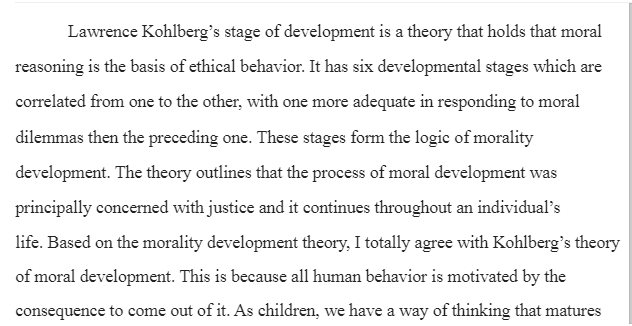Kohlberg’s Stages of Moral Development
Kohlberg’s Stages of Moral Development -Part A: 1. Do you agree with each of Kohlber’s stages of moral development and why or why not? Should motivation and moral reasoning be considered in the sentencing process such that crimes motivated by higher-level moral interest are subject to lesser types or degrees of punishment? If so, who determines what moral interests justify more lenient treatment?
Part B: Stage 6 moral development requires looking at ethical problems empathically; that is , impartially and from the perspective of all parties concerned. In the following situation, consider what the relevant needs and interests are of the participants, giving equal attention to their various perspectives.
A second-time convicted pedophile has just completed a mandatory fifteen year term in prison. The ex-offender is now living in your local community. Some residents are outraged that this man resides in this family-oriented neighborhood. The leadership of your home owner’s association calls for a “special” meeting. The purpose of the meeting is to discuss how the community should respond to the presence of a “pedophile roaming their streets.” At the meeting, some insist that the police should be contacted ant that they should handle the situation; others suggest than any pedophile, even if “reformed” is mentally unbalanced and, consequently, should be involuntarily hospitalized for psychiatric care; still others believe that the man should be completely shunned by all those who reside in the neighborhood because this will protect their children from the man.
1. How do you interpret this moral dilemma? What is the ethical thing to do here? Given Kohlberg’s levels and stages of moral development, how would you interpret the respective positions taken by your neighbors?
2. To the best of your ability, indicate which of Kohlberg’s stages of moral development might best explain the moral reasoning involved in the following:
a. Waging war to protect or further economic interests.
b. Engaging in a self-defensive war, having be attacked by another country.
c. Waging war to retaliate against another country.
d. Executing convicted murderers to serve vengeance.
e. Executing convicted murderers to protect the public from further harm
f. Avoiding paying taxes to further one’s profits.
g. Refusing to pay taxes as a mean’s of protest against injustice.
3. To the best of your ability, indicate how the following ethical dilemmas might be resolved based on each stage of Kohlberg’s model of moral development: use Table 7.4 as a guide.
a. Speeding versus not speeding
b. Lying versus telling the truth
c. Cheating on an exam versus doing honest work
Answer Preview-Kohlberg’s Stages of Moral Development

$5.00
